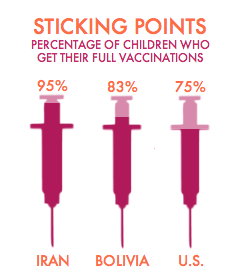
January 14, 2013 | Innovation, Science and Technology
Where the Girls Aren’t
How to get young women into the tech world.

By Maya Catherine Popa
If you were in Las Vegas in mid-January, strolling through the 2013 International Consumer Electronics Show, you would have seen enough new gadgets and gizmos to keep your thumbs busy forever. Every January, this techstravaganza launches the hottest must-haves: Xbox, Blu-ray, Netbook and more all debuted here. What you wouldn’t have seen, though, were many women.
Women may spend more on consumer electronics than men—at least according to one recent survey—but the number who actually design and engineer these smart, fast, ever-more-compact gadgets is embarrassingly small. In 2012 only 9 percent U.S. chief information officers—in other words, tech execs—were female.
It’s a situation that Reshma Saujani and Carolyn Leighton are working overtime to correct. "It's a perception issue," says Saujani, founder of Girls Who Code. "Society teaches girls that computer science and engineering aren't for them, and so they tend to opt out. When you ask elementary school students to draw a picture of a scientist, they draw a man in a white lab coat."
Girls Who Code trains young women between the ages of 13 to 17 in the skills they’ll need to get hired in technology or engineering. "With 1.4 million jobs opening in the technical fields by 2020, I knew we had to get serious about educating more girls, especially from under-served communities," Saujani says. "We launched our first program in New York last summer to teach 20 girls to be our next generation of entrepreneurs and engineers...They learn everything from how to build a mobile app to how to pitch a business plan. We also focus on mentorship and 'real world' experience. We took field trips to tech companies like Google so they really got a sense of what it's like to work in a technology company."
Leighton saw the handwriting on the white board years ago. Back in 1989 she founded Women in Technology International, making it the first organization devoted to the notion that women need tech skills to advance in corporate America and in their own businesses. "Becoming technology literate is critical to any career women chose," Leighton says. And she has no doubt that they can succeed in it. "Life and careers happen from the inside out," she says. "As women understand they are amazingly talented, smart and capable and decide to become unstoppable, the entire world will see a positive shift."
Besides, women are already having an impact from the purchasing end. "Women influence most consumer electronic purchases," Leighton says. "Tech companies that include women in the development process will create products that this biggest, and most influential demographic will want to buy. Recent research indicates that companies who have 25 percent or more women represented at the board and executive levels are showing higher profits."
Having women in the field will be good for everyone, not just the tech companies. "Women want to change the world," says Saujani. "The girls in our program weren't designing games, they were building products to help their communities. One girl built an app to help homeless youth find shelters in their neighborhoods. Cora, 15, built an algorithm to determine whether a cancer was benign or malignant. They are going to leverage the power of technology to make the world a better place. We need them."
Maya Catherine Popa is a writer for the Women in the World Foundation. She is currently completing a Master's in Creative Writing at Oxford University under a Clarendon Scholarship, as well as an MFA in Poetry from NYU. She co-leads a weekly writing workshop for veterans of Iraq & Afghanistan. Her writing appears in The Huffington Post, Locustpoint, and elsewhere.